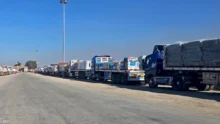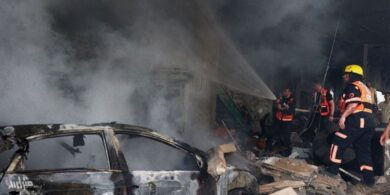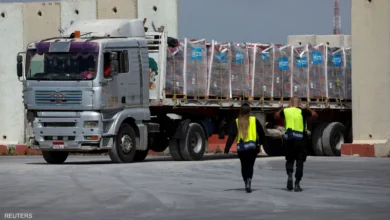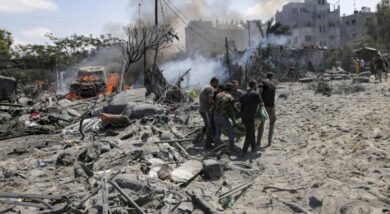Trump again threatens Hamas, says Israeli military awaiting his signal to resume fighting
شبكة الخامسة للأنباء - غزة

U.S. President Donald Trump escalated his rhetoric toward Hamas, saying he might allow Israel “to go back into those streets as soon as I utter the word,” and that he would consider permitting the Israeli prime minister to resume military operations if Hamas refused to comply with the ceasefire agreement or disarm. He added that freeing the hostages and returning the bodies of the dead remain a “matter of utmost importance.”
In Tel Aviv, the defense leadership signalled readiness for all possibilities: media reports and official signals said the defense minister instructed the General Staff to prepare comprehensive operational plans to be activated if the truce collapses or if Hamas refuses to abide by the terms of the next phase of the agreement. Several reports linked Trump’s remarks to the Israeli army’s preparations to draw up tactical and strategic plans to return to fighting if necessary.
The field has not fully calmed: at the same time, Israeli and intermediary authorities received additional bodies from inside Gaza while aid convoys entered through partially open crossings. Press and security reports said more remains of captives were handed over and technical and medical procedures to identify them have begun, adding pressure on the course of the second phase of the agreement, which includes disarmament and reconstruction.
Washington says it is closely monitoring the implementation of the agreement and is increasing pressure on Hamas to fully comply, including demanding the delivery of all the bodies it holds and their locations. The U.S. administration, according to media sources, is coordinating next-phase steps with regional and international partners to ensure conditions for disarmament and reconstruction.
International and local sources spoke of concerns about a new escalation or a “return of operations” if disputes over the handing over of bodies or Hamas’s compliance with the security and political conditions of the second phase intensify — which helps explain the blunt tone of threats from Washington and the Israeli security institutions’ preparations of contingency military plans.
In the background, the humanitarian issue remains prominent: the entry of aid, the opening of designated crossings, and medical procedures to speed identification of the bodies, while international calls have grown to create an environment that prevents the current agreement from collapsing and becoming a gateway to a full return to fighting. At the same time, questions are being raised about how any effective disarmament could be implemented in a troubled enclave surrounded by complex security and political variables.
The bottom line: Trump’s warnings and comments by Israeli security leaders have reintroduced the prospect of a “return to war” as an option if Hamas fails to comply with the agreement; the greater challenge remains how to move from a fragile ceasefire to an orderly implementation that ensures disarmament, reconstruction and the protection of civilians without igniting a new military confrontation.






